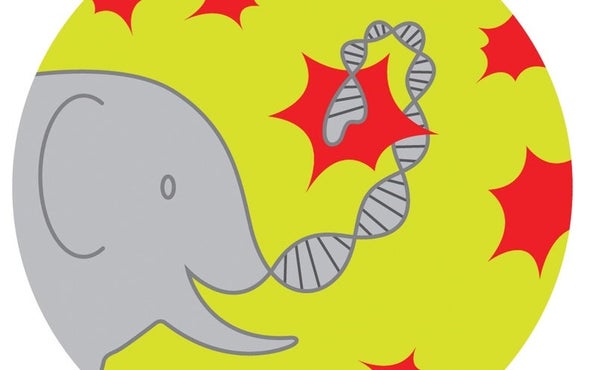Scientists call it Peto's paradox: cancer is caused by gene mutations that accumulate in cells over time, yet long-lived animals that have lots of cells, such as elephants and whales, hardly ever get it. Why?
For elephants, at least, part of the answer may be the gene commonly known as p53, which also helps humans and many other animals repair DNA damaged during replication. Elephants have an astounding 20 copies of this gene. Those copies, each with two variations called alleles, produce a total of 40 proteins, compared with humans' (and most animals') single copy producing two proteins.
New research in Molecular Biology and Evolution delves into how elephants' many copies offer cancer-fighting advantages. The work “opens many new possibilities to study how cells protect themselves from a damaged genome, both in elephants and in humans,” says study co-author Robin Fåhraeus, a molecular oncologist at France's National Institute of Health and Medical Research.
In mammals, p53 plays a crucial role in preventing mutated cells from turning into tumors. It works by pausing replication and then either initiating repair or causing cells to self-destruct if the damage is too extensive. Without action from p53, cancer can easily take hold: in more than half of all human cancers, the gene's function has been lost through random mutations.
The scientists virtually modeled and examined elephants' 40 p53 proteins, finding two ways the gene could help elephants avoid cancer. First, the fact that elephants possess multiple copies lowers the chance of p53 no longer working because of mutations. Additionally, elephants' p53 copies activate in response to varying molecular triggers and so respond to damaged cells differently, which likely gives an edge when detecting and weeding out mutations.
These “remarkable” results imply that elephants have a spectrum of means through which p53 can operate, says Sue Haupt, a cell biologist at the Peter MacCallum Cancer Center in Australia, who was not involved in the work. This points to “exciting possibilities for exploring powerful new approaches to cancer protection in humans,” she adds.
Fåhraeus and his colleagues are now following up on these results using blood samples from an African elephant at the Vienna Zoo. They are exploring how its p53 proteins interact with damaged cells and other key molecules and plan to compare those findings with results from human cells.
“Elephants, with their low incidence of cancer, have emerged as a surprising resource in human cancer research for understanding the intrinsic cellular response to DNA damage,” says Fox Chase Cancer Center virologist Virginia Pearson, who was not involved in the study. “This is an important publication.”


